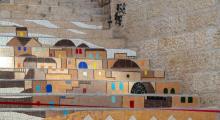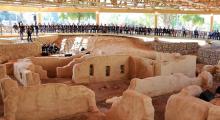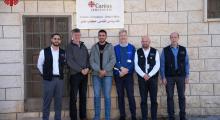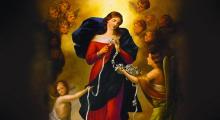Issued by the Catholic Center for Studies and Media - Jordan. Editor-in-chief Fr. Rif'at Bader - موقع أبونا abouna.org
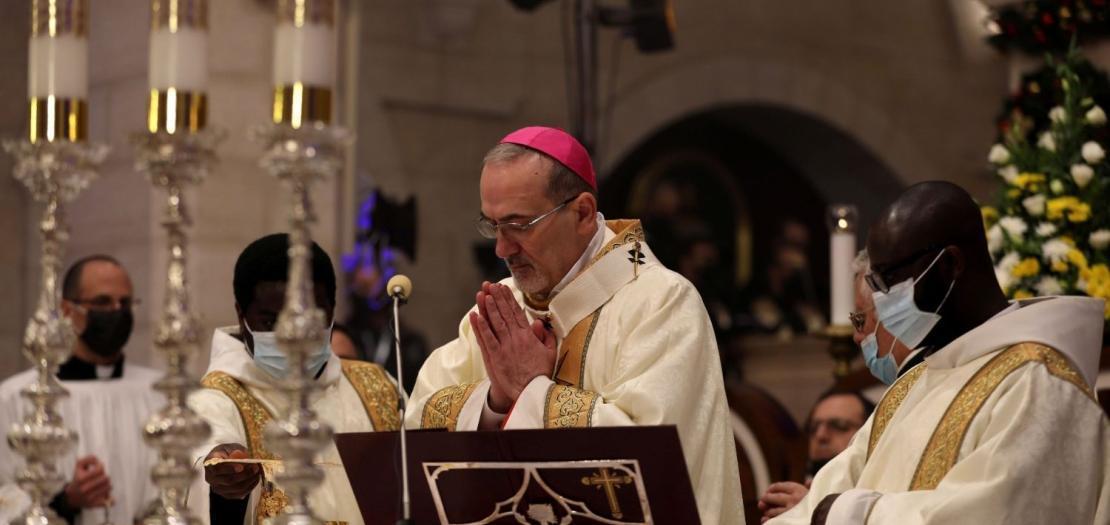
Following is the text of the diaconal ordinations homily by His Beatitude Cardinal Pierbattista Pizzaballa, Latin Patriarch of Jerusalem, dated April 13, 2024:
Most Reverend Father Custos,
Dear Brothers and Sisters,
Dear Candidate Brothers for the Diaconate,
May the Lord give you peace!
Once again, the liturgy offers us an encounter with the Risen Lord. The Gospel passage we just heard from the Gospel of Luke reminds us of a similar story from the Gospel of John, which we have read several times recently.
In this passage, we find the same elements in almost all the accounts of the encounter with the Risen One: Jesus manifests himself first, then the disciples' fear and doubts mixed with joy and confused amazement. The greeting of peace, and the nail marks as signs of Jesus' newfound identity, the understanding of the scriptures, and the mandate to proclaim the good news to the whole world. In different forms in these stories, there is always a Eucharistic reminder, such as the breaking of the bread in Emmaus or the fish roasted on the shores of the Lake of Galilee.
These are the elements around which the first Christian communities will take shape, and which will accompany the lives of all disciples throughout the ages, right up to today. For you too, dearly beloved, who from today will assume the ministry of service, and who will approach the Eucharist in a new way, you too are called to bring back to your consciousness as Christian believers the heart of your Christian, religious and ministerial experience: the Eucharist as the heart and synthesis of your life of faith and as the proclamation of salvation. Celebrating the Eucharist means experiencing Easter, by giving praise to God for His work of salvation, bearing witness to having met the Risen One, having seen His wounds, having received the gift of peace, and also not being able to remain silent in the face of so much grace.
In this passage, the evangelist emphasizes a great deal on the identity of Jesus. The disciples "were startled and terrified" (Luke 24:41) because they "thought that they were seeing a ghost" (Luke 24:37). In short, they were confused, doubtful, and unable to comprehend what had happened. To "convince" his own that he is not a ghost, Jesus eats and drinks what they offer him (Luke 24:42-43). To say that the Risen One is not an image, an idea, or a thought: but rather he is a real presence, he is someone who always shares real life with us. The Eucharist, which you will serve as deacons, must first and foremost be this experience of a real encounter with Christ and to be witnesses of the Resurrected life.
In fact, Jesus promises his faithful presence to his Church, within history: a history that will be no less dramatic than his own, but which we will be able to count on him and his Easter gifts, on the Spirit that he will give us in fullness on the day of Pentecost.
This is what the Church needs more of today and before any other pastoral strategy: to testify that Easter, that the love of God that Jesus manifested with his death and resurrection, is not a fantasy, not an idea, a tale, a phantom, but a real experience that can reach everyone. And that the Church is not an institution of power, far removed from people's real lives, a complicated structure to understand, but is first and foremost a community of people who have encountered the Risen Jesus and who cannot help but say how wonderful it is to encounter Christ.
Another element, that the resurrection narratives refer to is the scriptures: "...he opened their minds to understand the scriptures" (Luke 24:45). Jesus stops with them and reflects on the history of salvation, as narrated in the scriptures. And he opens. Jesus died opening: at his death, the veil of the temple is torn open, the centurion opens to faith, the tombs open... And the risen Jesus continues to open: he opens the tomb, he opens the minds to understand the scriptures. He makes them see what life really is, which is a continuous Easter. And he makes them see that this has always been inscribed in the depths of God's life and history with Man.
Your service as deacons includes not only service at the Eucharistic table but also service in proclaiming the Word of God. Now you can also preach from the various pulpits. From now on, familiarity with the Word of God must be a constant in your ordained ministry. Before proclaiming and commenting on it, you must feed on the Word of God. It is not a matter of being capable of some exegetical elaboration, or of impressing the audience, a temptation that will always be insidious and latent. These are things that perish with time and are not to be found, nor do they help build anything and leave nothing behind. Instead, it is a matter of building your life around visiting the Word of God frequently, which is the Word of life and which will gradually shape your ministry. It will nourish your listeners to the same extent that it will nourish you, and not otherwise.
A further consideration relates precisely to the proclamation: the Church is called to take off. First of all, Jesus opens minds and hearts so that His Word may be understood and welcomed, but also so that it may be proclaimed. It is then a matter of starting from there, from the experience of the encounter with the Risen One, to go everywhere, with the mind opened by the Scriptures, and be a witness to God's logic, which is always paschal logic, fully revealed in Jesus. The Church cannot announce anything other than this, because this alone she has witnessed. She has witnessed, in a special way, that God forgives, and that the Risen One can be encountered where one opens oneself to his mercy that heals and saves. If the Church announced anything else, if it espoused any other logic, it would cease to be the Church of the crucified and risen Lord.
This is why Easter time grants us the gift of remaining in the Upper Room so that our minds too can be opened to the Scriptures, and we learn to be the Church that makes room for the Risen One, that walks with Him, that witnesses to Him faithfully.
Will you be able to live like this? I sincerely hope so. We really need witnesses like that.
Allow me here one last reflection on this very last verse of today's Gospel: "beginning from Jerusalem." (Luke 24:47)
Let that "beginning from Jerusalem" not only be understood as a temporal or geographical indication but also as a spiritual reminder. After all, Jerusalem is not only a physical place but also a place of the spirit. Jerusalem is an image of the Church; it is the source from which flows the "river of life-giving water" (Rev. 22:1), which reaches all nations and heals them, bringing the proclamation of salvation that the world awaits.
I like to think of this as an indicator of the life of the whole Church, which also expresses our particular vocation as the Mother Church, the church of Jerusalem.
"For from Zion shall go forth instruction, and the word of the LORD from Jerusalem" (Is. 2:3). Salvation has its heart in Jerusalem. The word 'here' which we like to highlight in our Holy Land liturgies is significant. And it expresses one of the faces of the multifaceted vocation of the Church of Jerusalem. That river of life that flows from the throne of the Lamb, has its source here, and our existence here, in the Holy City, is a call to cherish the memory of that event, from which the living water continues to flow, healing the nations of the world.
Therefore, to be and to do Easter in Jerusalem, means, for our Mother Church to continuously and daily be capable of extending forgiveness, and openness to the other, while giving attention to the wounds of Christ, that is, to the suffering that wounds the lives of these people, wounds that always produce pain, but that can also be an occasion of joy, of new life, of encounter, as it was for the disciples.
This is how I would like for us to be that place of encounter, that spring of living water, which forever quenches that thirst for love, trust, acceptance, and a life that lies hidden behind so much fear, in everyone's heart. This is how that spring of living water is kept alive, this is how our community can bring healing here and to the world, "beginning from Jerusalem".
It does not matter if you have to start over each time. It is the encounter with the Risen One that drives us to this. And if we didn't do it, if we didn't celebrate that Easter every day in that way, that spring would remain restrained, and that living water could no longer reach the nations and heal them.
We are certainly a small church, uncertain about many things, and poor in resources. Like the disciples in the Cenacle, struggling to believe. But we are not expected to be perfect, nor professional, but to trust, to entrust our lives to the Risen One, the only way to credibly preach "repentance, for the forgiveness of sins." (Luke 24:47)
This is my wish for you all!
+Pierbattista


